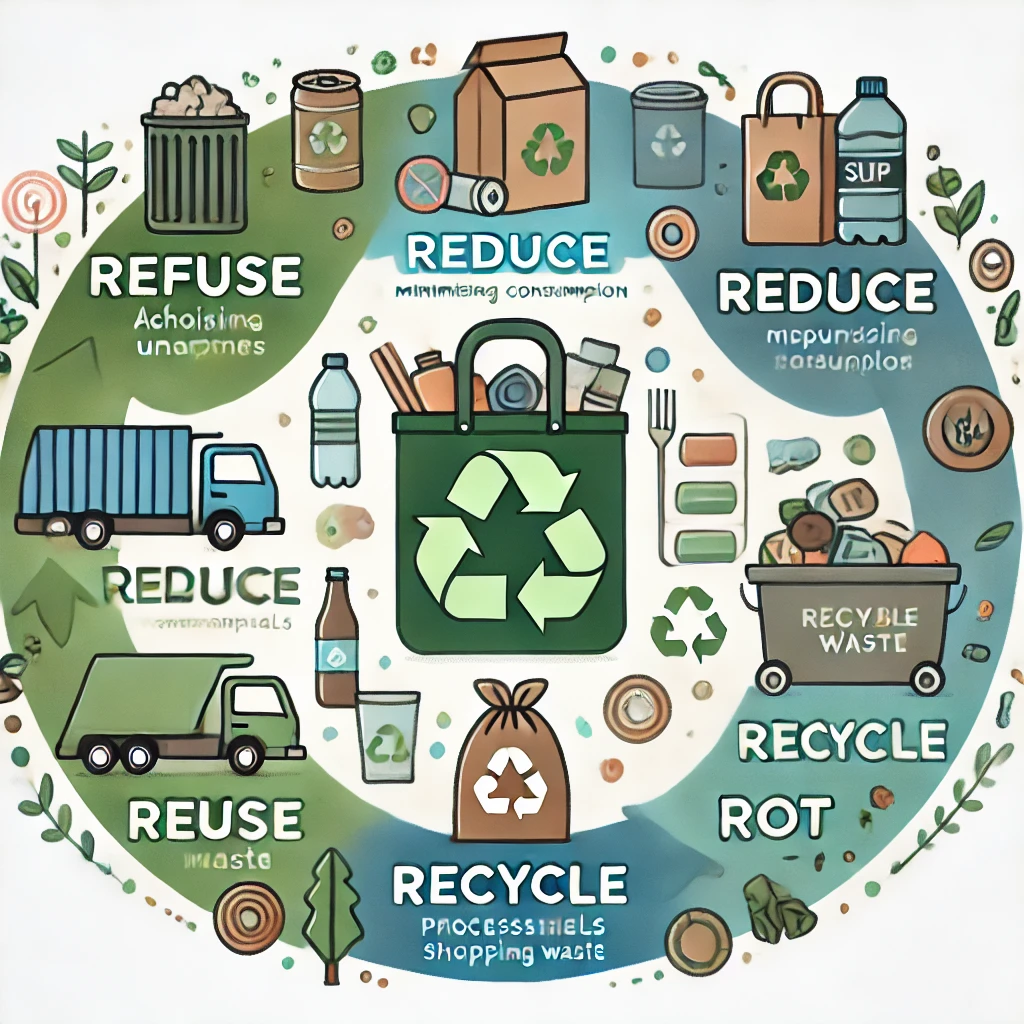
Sustainable Living and Eco-Friendly
How to Achieve Zero Waste Management: A Complete Guide


DINKAR
11/11/2024
How to Achieve Zero Waste Management: A Complete Guide
In today’s world, where environmental concerns are at an all-time high, zero waste management has become a goal for many individuals, businesses, and communities. This guide will walk you through actionable steps to achieve a zero-waste lifestyle and contribute to a healthier planet.
What is Zero Waste Management?
Zero waste management is an approach aimed at reducing the amount of waste sent to landfills or incineration by redesigning products, changing behaviors, and recycling materials. The ultimate goal is to produce as little waste as possible, encouraging a circular economy where resources are continuously reused.
Why Zero Waste Management Matters
Achieving zero waste has multiple environmental, economic, and personal benefits, including:
- Reducing Greenhouse Gas Emissions: Landfills release methane, a potent greenhouse gas. Minimizing waste reduces these emissions.
- Saving Natural Resources: Reusing materials helps conserve resources like water, minerals, and energy.
- Cost Savings: Reducing waste can lower disposal costs and encourage efficient resource use.
- Encouraging Sustainability: It promotes a sustainable lifestyle, conserving resources for future generations.
1. Assess Your Current Waste
Before making changes, assess where you’re generating waste. Try a waste audit: collect all waste for a week and categorize it. Look for items that can be reduced, reused, or recycled. Common waste categories include:
- Plastics (bags, bottles, packaging)
- Organic waste (food scraps, yard waste)
- Paper and cardboard
- Metal and glass
Once you’ve identified where waste is coming from, set clear goals, like reducing plastic by 50% or composting all organic waste.
2. Adopt the 5 R’s of Zero Waste Management
The 5 R’s framework offers a practical approach to achieving zero waste:
- Refuse: Say no to items that will become waste, like single-use plastic straws or unnecessary packaging.
- Reduce: Minimize what you bring into your life. Buy only what you need to avoid excess.
- Reuse: Opt for reusable alternatives—cloth bags, glass jars, and metal utensils.
- Recycle: For items that can’t be refused, reduced, or reused, recycling is the next best option.
- Rot (Compost): Organic waste, like food scraps, can be composted to enrich soil and prevent landfill waste.
3. Sustainable Shopping Habits
Make conscious choices at the store to prevent waste:
- Buy in Bulk: Purchasing items in bulk reduces packaging waste and often saves money.
- Opt for Reusables: Carry reusable bags, water bottles, coffee cups, and utensils.
- Choose Eco-Friendly Products: Look for brands that use minimal or compostable packaging.
- Plan Meals to Prevent Food Waste: Create a weekly meal plan to reduce leftovers and expired items.
4. Reduce Household Waste
Making your home zero-waste involves small, actionable changes:
- Switch to Refillable Products: Invest in refillable containers for soap, shampoo, and cleaning products.
- DIY Cleaning Products: Make natural cleaners with ingredients like vinegar and baking soda.
- Choose Cloth Over Paper: Use cloth napkins, towels, and rags instead of disposable paper products.
- Embrace Digital Alternatives: Reduce paper waste by going digital for bills, notes, and subscriptions.
5. Composting Organic Waste
Composting is one of the most effective zero-waste methods for organic material:
- Start a Compost Bin: Set up a compost bin in your kitchen or backyard. Composting turns food scraps and yard waste into nutrient-rich soil.
- Understand Composting Basics: Combine green materials (fruit peels, vegetable scraps) and brown materials (leaves, cardboard) for balanced compost.
- Explore Worm Composting: Vermicomposting uses worms to break down organic waste and is great for apartments and small spaces.
6. Recycling Wisely
Recycling helps manage waste that can’t be eliminated. However, it's essential to follow local recycling guidelines:
- Sort Waste Properly: Separate recyclables like paper, metal, and glass. Make sure they’re clean and free of food residue.
- Learn What’s Recyclable: Not all plastic is recyclable. Check codes on plastics to understand what can go in your recycling bin.
- Utilize E-Waste Facilities: Electronics can’t go in regular recycling bins. Look for e-waste recycling centers for old phones, batteries, and computers.
7. Zero Waste in the Workplace
Achieving zero waste isn’t limited to home; workplaces can make sustainable choices too:
- Encourage Reusable Supplies: Supply reusable pens, dishware, and water bottles.
- Set Up a Recycling Station: Make recycling bins accessible and label them clearly for easy sorting.
- Opt for Digital Files: Reduce paper use by going digital with documents and records.
- Promote Carpooling or Biking to Work: Reducing emissions from transportation contributes to an overall sustainable lifestyle.
8. Join or Start a Zero Waste Community
Being part of a zero-waste community can boost motivation and inspire new ideas:
- Community Composting Programs: Many cities offer composting services for residents. If not, start a program in your area.
- Clothing Swaps and Repair Cafés: These events encourage sharing and repairing items instead of buying new ones.
- Social Media Groups: Join zero-waste groups online to share ideas, get advice, and stay inspired.
9. Track Your Progress and Stay Motivated
Measure the effectiveness of your zero-waste efforts to stay motivated:
- Keep a Waste Log: Record your waste reduction progress. This helps identify areas for improvement.
- Celebrate Milestones: Set and celebrate milestones, like composting all organic waste or going plastic-free for a month.
- Learn from Mistakes: Don’t be discouraged by setbacks. Zero waste is a journey, not a destination.
Common Myths About Zero Waste Management
Myth 1: Zero Waste is Expensive
While it may require an initial investment in reusable items, zero-waste habits save money over time through reduced purchases and minimal waste disposal costs.
Myth 2: It’s Only for Eco-Experts
Anyone can work toward zero waste, regardless of experience. Start with small steps and build from there.
Myth 3: Zero Waste Means Zero Trash
Zero waste isn’t about achieving no trash; it’s about minimizing it as much as possible. Progress is what matters.
Final Thoughts on Zero Waste Management
Zero waste management is an achievable and impactful lifestyle choice. By taking small steps and being mindful of the waste we generate, we can create a sustainable future for ourselves and future generations. Remember, every effort counts, no matter how small. Start today, and be a part of the zero-waste movement.